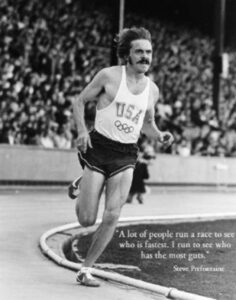SELF-DISCIPLINE IS AT THE HEART OF MARATHON TRAINING

According to Kenyan long-distance runner and Olympic marathon champion Eliud Kipchoge, “Self-discipline is not a one-night affair. One develops it step-by-step. You can’t step into a gym for a day and build muscle. It takes time to build muscle. Similarly, to train for a marathon, you must follow a training plan and train for months before adapting to withstand the rigours of a marathon race.
The word ‘discipline’ comes from the Latin word disciplina, which means teaching or learning. Self-discipline is “the capacity to regulate one’s emotions and behaviour” or “self-control.” Discipline is the foundation of success in any endeavour.
A study published in Frontiers in Psychology has found that self-discipline is a better predictor of success than IQ or socioeconomic status. It also found that people with high self-discipline have better life outcomes, such as higher grades, more employment opportunities, and lower levels of substance abuse.
In the world of running, too, couch potatoes, through self-discipline, can become marathon runners. Couch potatoes spend much time sitting on their couches watching TV, playing video games, or surfing the Internet. While it’s not always easy to get up and move around every day, many couch potatoes find that they can achieve fitness goals by breaking up long periods of sitting with short bursts of activity. If you’re a couch potato, try to get up every 30 minutes and do some light walking or stretching. Or, if you have access to a gymnasium, go for a quick workout that doesn’t require any equipment (e.g., walking on a treadmill). The key is to get moving every once in a while, even if you don’t feel like it, to improve your overall fitness level and keep you from gaining too much weight.

Breaking the addiction of sitting for long hours can help build strength in the core and improve posture, thus helping keep an active mind. You may struggle with this. It would be best if you started slowly and gradually increased your speed. If you are new to running, start walking for short distances before gradually increasing your time on foot. You should also stretch after every run and take rest days when needed. Over time, you will see improvements in your running form and endurance. Running is an excellent means of losing weight and building strength while keeping the mind fit. Running goes beyond physical health as it helps maintain a healthy lifestyle by encouraging exercise. A sedentary lifestyle can lead to weight gain and other health problems such as high blood pressure, diabetes, and heart disease. By incorporating running into your daily routine, you can prevent these health issues and feel better overall. The 36-year-old Janine Joubert was a couch potato who lived in Hamilton, Newzealand. She was depressed, on medication, overweight, unfit and sick with asthma and high blood pressure. In May 2014, she ran her first marathon in Rotorua. If she could do it, there is no reason why you can’t do it?
In the film “Brittany Runs a Marathon”, Brittany is a mid-20s party girl battling her weight, finances and toxic relationship. Quite broke to join a gym and too hesitant to ask for support, Brittany attempts to reshape her life with the once-unimaginable goal of running the New York City Marathon. Unhappy with her weight, diet, and overall daily undisciplined life, Brittany takes baby steps with the eventual goal of running a marathon. The movie ends with Brittany crossing the finish line after a long, agonising buildup to the race, which comes from self-discipline.

‘Run Fatboy Run’ is another flick based on running that tells the tale of Dennis, a paunchy middle-aged man who sets out to run a marathon to win back his ex-girlfriend Libby, whom he had left at the altar five years ago. Meanwhile, Libby meets Whit, an athlete planning to run a marathon and gets engaged to him. To prove to Libby that he too can run and win her, Dennis, who has no previous marathon training, trains from scratch battling blisters, chafing, and fatigue to run a marathon. The movie is a story of self-discipline, the triumph of the human spirit over sloth, and indiscipline. Towards the movie’s end, Dennis collapses near the marathon finish line and cannot get up, but upon seeing Libby calling to him, he gets up, sprints to the finish and slumps in her arms. Sothe final message of this feel-good film, is that every goal we set is attainable.
Many celebs who started as couch potatoes became self-disciplined runners. One of the most famous is Steve Prefontaine, a runner from the University of Oregon. In 1975, he worked as a carpenter when he decided to try out for a local track team. He never made it onto the track team, but that didn’t stop him from running. He would practice by jogging on the nearby track and then run along the beach at night. Eventually, his workouts pay off, and he makes it onto the track team at the University of Oregon. There, he started to be known as “Pre” because of his short stature and speed on the track.
 As his career progressed, Prefontaine continued to find ways to push himself further. He set long-distance records for both men and women, won several gold medals in international competitions, and even set an American record for indoor mile running at the Oregon Trials in 1973. Of course, these achievements would not have been possible without hard work. And even though Prefontaine started as a lazy couch potato, he eventually became one of the most famous runners in history because he worked hard to become a self-disciplined runner.
As his career progressed, Prefontaine continued to find ways to push himself further. He set long-distance records for both men and women, won several gold medals in international competitions, and even set an American record for indoor mile running at the Oregon Trials in 1973. Of course, these achievements would not have been possible without hard work. And even though Prefontaine started as a lazy couch potato, he eventually became one of the most famous runners in history because he worked hard to become a self-disciplined runner.
All the discipline and hard work Steve puts in is evident in ‘Without Limits’, a powerful Hollywood movie that tells the story of Steve. The film also brilliantly cuts live footage of his famous attempt to win a gold medal at the Munich Olympic Games in 1972. In the rock and roll world, or other realms, for a person to earn the title of a “legend”, they would have to be controversial, have disdain for authority, be blessed with immense talent, and, most importantly, have a life that ends too soon. The life of American distance runner Steve Prefontaine flawlessly had it all. The flick reveals how Prefontaine delighted in almost rock-star status due to his running ability and defied the conventions of the time – dragging the sport into a new era. Steve once said: ‘I don’t run to see who has the best endurance, I run to see who has the most guts. I know that is me. One can develop mammoth confidence in Steve if one cultivates the self-discipline and determination to demolish whatever goal is in front of them.
 Another world-famous long-distance runner who went from being a couch potato to a 2014 British Championship 100 km race in a record time of 6:19:20 at the age of 39 is Steve Way. He began running seriously in 2007 to overcome lifestyle-related health issues, and he weighed over 100 kgs and smoked 20 cigarettes a day. But by 2014, he had run the London Marathon under 2:20 four times and also broke the qualifying time of 2.17 for the Commonwealth Games for the first time 2014.
Another world-famous long-distance runner who went from being a couch potato to a 2014 British Championship 100 km race in a record time of 6:19:20 at the age of 39 is Steve Way. He began running seriously in 2007 to overcome lifestyle-related health issues, and he weighed over 100 kgs and smoked 20 cigarettes a day. But by 2014, he had run the London Marathon under 2:20 four times and also broke the qualifying time of 2.17 for the Commonwealth Games for the first time 2014.
Another inspiring story of a famous runner who became great through self-discipline is that of Stephen Kiprotich. He was born in Uganda, and his uncle seeing his unusual talent for running, decided to sponsor his running. Soon, Stephen became the first Ugandan to win the New York Marathon and also the first Ugandan to win Olympic Gold. Stephen himself attributed his success to solid self-discipline and commitment to training, which he developed through his early years of running while working hard to earn money for himself and his family. Self-discipline allows us to make the right decisions by aligning them with our values, and helps us discover our purpose. Working on our purpose with self-discipline builds confidence and resilience to face setbacks and emerge victorious in whatever field one pursues.

I want my readers to take to running because running is a great way to build self-discipline, a key component of success. Running can motivate people trying to be healthy, lose weight, or get fit for a marathon. For someone not interested in fitness, running can seem like a huge challenge. In the preceding paragraphs, we have already seen some famous people who started as couch potatoes become accomplished runners through self-disciplined. They all started slow and got the hang of it; eventually, through commitment and persistence went on to become accomplished runners. So, you too, when you run and get into good shape, your confidence will skyrocket, and you’ll start feeling better about yourself. You’ll also be able to make more decisions confidently, leading to tremendous success in all areas of your life. In addition to building self-discipline, running can help you manage stress and depression, improve memory, and even prevent diabetes. All this makes running a win for everyone! So if you decide to take up running and are enthusiastic about running, there is no better day than today. But before you embark on running, here are some aspects that you should bear in mind Start slow; walking is always an option if you’re getting used to exercise.
- Remember that it takes time to build up stamina; even the most experienced runners need time to build up their endurance.
- Ensure you’re eating correctly and taking the time to rest when needed.
- Running is hard work, so make sure you have time for rest days too!
There are many ways to become a great runner. Some people find success through genetics, while others rely on dedication and perseverance. Whatever path you take, one thing is sure: self-discipline is necessary for success. An overabundance of self-discipline can be a real asset in the running. Without it, runners risk burning out before they ever get started. Self-discipline allows runners to stay committed to their goals and remain motivated on the long journey ahead. I find that all successful runners have some things in common. First, they are highly focused individuals who know what they want out of life. Second, they are committed to their goals and do whatever it takes to reach them. Third, they consistently practice self-control: eating well, getting enough sleep, and staying hydrated when needed—in short, being self-disciplined means that you take care of yourself every step of the way so that you can achieve your goals and reach your full potential.

Once you become a runner and start loving running, you can set your eyes on running a marathon. For a runner to turn into a marathoner, self-discipline is again a prerequisite. Training for a marathon needs a ton of mental strength to wake up at 5 am, jump on the treadmill for an hour before heading off to work or school, and then come home after 9 pm. Running a marathon is an exciting challenge; it takes commitment, focus, and determination. Athletes need to establish clear goals and a robust support system around them. One can develop Self-discipline through dedication, hard work, and constant practice. A marathon aspirant must develop self-discipline early in an athlete’s training regimen—especially if they have never set these goals. Self-discipline is also vital for any athlete who wishes to compete at an elite level. The ability to stay focused and keep a long-term goal in mind can help athletes push through difficult times and reach their full potential.
Further, marathon aspirants need to control their actions and behaviours in the face of temptation. They should develop the ability to resist short-term gratification in favour of long-term goals. In many ways, self-discipline is the opposite of impulsivity. Impulsivity is an inability to delay gratification, which is crucial for long-distance running. That said, self-discipline is a skill that needs to be learned and developed over time. Long-distance runners need to learn how to practice delayed gratification. They need to know how to train their willpower muscles and make it a habit, not just a temporary act. They can achieve it through mindfulness meditation, yoga and other forms of meditation or by taking some time out each day to focus on their goal and commit themselves to it no matter what.
 A marathon aspirant must also develop the ability to recognise his emotions and learn how to manage them. The people who are good at noticing how they feel can calm themselves down or adjust their behaviour and generally achieve their goals. A marathoner with self-discipline controls his emotions and behaviours when needed, staying focused on his goal. Self-discipline is also about setting priorities and ensuring that you spend time doing important things rather than spending all of your time striving to train for a marathon. It would help if you worked on self-discipline daily; the more you practice it, the better it gets.
A marathon aspirant must also develop the ability to recognise his emotions and learn how to manage them. The people who are good at noticing how they feel can calm themselves down or adjust their behaviour and generally achieve their goals. A marathoner with self-discipline controls his emotions and behaviours when needed, staying focused on his goal. Self-discipline is also about setting priorities and ensuring that you spend time doing important things rather than spending all of your time striving to train for a marathon. It would help if you worked on self-discipline daily; the more you practice it, the better it gets.
Why Self-Discipline is at the Heart of marathon Training and Running
Self-discipline is one of the biggest challenges to anyone’s running routine, let alone a runner’s training schedule. Regarding training for a long run, staying on track with your runs and not devolving into painful self-flagellation is about as much fun as being spanked with a wet noodle. Nevertheless, staying disciplined in your training requires just a tiny bit of effort, and the good news is that once you understand the why and how of self-discipline, you can build up your inner strength over time. Self-discipline isn’t easy because it means making choices daily to say no to things that would make us happy or comfortable instead of saying yes to what we need most to succeed. And this is why self-discipline is at the heart of marathon training and running itself.
Self-discipline is a critical component of a successful long-term commitment to any endeavour. It’s the ability to prioritise your goals over other temptations and distractions. Self-discipline is the ability to delay immediate gratification in favour of long-term goals. Self-discipline is a complex combination of habits, attitudes, and values that influences everything we do, including our health and fitness goals. To train for a marathon, you must have self-discipline. It would help if you remained committed to your training schedule no matter what life throws your way, which requires both self-awareness and self-control. Self-awareness involves recognising your strengths and weaknesses to compensate for them when necessary. Self-control is the opposite of self-discipline; it’s the ability to do what you want when you want without giving in to temptation. Without these two qualities, it isn’t easy to stick with a long-term goal such as training for marathons.
Why is Self-Discipline at the Heart of Marathon Training?
 One word that best describes the running lifestyle is perseverance. It’s a word that can be associated with anything you set your mind to, whether it’s an Olympic gold medal, writing a bestselling book or completing a marathon. Running is no different. The key to success is finding something you enjoy doing and sticking with it long enough to see results. It takes a lot of hard work and determination to become a great runner, but anyone who has taken the first steps on their journey will tell you there is no other feeling like it.
One word that best describes the running lifestyle is perseverance. It’s a word that can be associated with anything you set your mind to, whether it’s an Olympic gold medal, writing a bestselling book or completing a marathon. Running is no different. The key to success is finding something you enjoy doing and sticking with it long enough to see results. It takes a lot of hard work and determination to become a great runner, but anyone who has taken the first steps on their journey will tell you there is no other feeling like it.
When we’re in our early 20s, self-discipline may not be a problem at all. It may be one of your most vital qualities. But as you wander track, self-discipline becomes much more of a problem. Why? It’s because as we get older, our brain starts to change a little, and what works in your 20s may not help in your 30s or 40s. Another reason self-discipline becomes much more difficult as we get older is that other things compete for our attention. In our 20s, we are very focused on just getting to the top, but in our 30s and beyond, we have the goal in our mind and the security of having a stable income and career. These things add up to make self-discipline much more of a challenge in our 30s and beyond.
Decide when you’re going to run, not when you can?
If you have a fondness for running, you can become a dedicated runner. If you want to get serious about marathon training, it’s also critical that you learn to make the most of your time so that you know exactly when you will run and that you do not “wander track” yourself. The best way to do this is to decide when you’re going to run and stick to it, even if that means running when it’s raining or when no one else wants to be out running. Also, when deciding when to run, you must fix and desist from procrastination. Once you determine when to run, getting out the door will be much more challenging.
What will keep you accountable and on the path? What will help you succeed?
The first step to building up your self-discipline as a runner is to decide with your running buddies that you will stick to your running schedule daily. For marathon training, you’ll need to commit to being out on the road every day because that will help you succeed. How? As runners, we often feel like the ones who “should” be accountable because we are out on the road. We are not “supposed” to be out there, doing what we love to do. We may feel guilty for not being “ready” for our runs or for not being disciplined enough to get out on the road. If you expect to get more out of running, however, you have to learn to feel accountable for being out on the road, which means feeling like you are keeping yourself on track and responsible for your success.
How to develop self-discipline in your running routine
Self-discipline is something that one can develop over time. The key is gradually challenging yourself to engage in activities you have not yet done. For example, if you have never run a 5k, then first run a 5k, then run a 10k, then run a half marathon, and finally, run a marathon, you have now completed five different types of running events. If you have not yet run the 6th event, however, then run a 5k, a 10k, a half-marathon, and then a full-marathon; you now have six different types of running events under your belt. Keep challenging yourself to complete new activities, and you will naturally develop self-discipline as you become more and more comfortable with the idea of doing new things.

As runners, we know that a long run is essential to training for a marathon. But how can you train effectively? Running a long-distance isn’t easy. It takes a lot of focus and self-discipline to grit your teeth and keep going at the same pace for the hours it takes to complete a run. If you’re ready to take your running to the next level and run faster than ever, you need to add more self-discipline into your training as soon as possible. It would help if you also worked on adding more variety to your runs by mixing in shorter intervals with hills or speedwork.
Race Day Self-Discipline
Race day self-discipline is the final frontier of self-discipline, and if you want to achieve your best marathon performance, then this is the most critical aspect of self-discipline you will need to practice. You have a choice regarding how you want to feel on race day and how you want to perform. You can choose to feel excited and optimistic, or you can choose to feel anxiety and dread. The key is to decide how you want to touch on race day and then focus on the aspects that will help you succeed in those chosen feelings. Your race day self-discipline should be twofold: First, you must mentally prepare yourself for the event by either visualising yourself performing well or by writing down what you want to accomplish in your run. Second, you need to physically prepare yourself so that you don’t slow yourself down by taking too much time to get to the starting line or not eating enough before the run.
Self-Discipline for Training
As you train for your first marathon, gradually introducing new types of running into your training is the key to building up your self-discipline. For example, the first type of running you will want to introduce into your workout is “interval training”: running at an intensity that is slightly harder than what you’re used to on your long runs but not so hard that it causes you to break a sweat. Interval training helps you gradually increase your pace and thus your pace-security. Interval training is also ideal for building up your self-discipline, as it focuses on pushing yourself to run harder, but not so hard that you start feeling “out of control”. As you pull into your training schedule, you’ll want to gradually start incorporating “speed work”: running at a pace between your long runs but still slightly slower than your marathon pace. Speed work helps you progressively increase your pace-security.

How to build up your training intensity over months
As runners, we know that a long run is essential to training for a marathon. But how can you train effectively? Running a long-distance isn’t easy. It takes a lot of focus and self-discipline to grit your teeth and keep going at the same pace for the hours it takes to complete a run. If you’re ready to take your running to the next level and run faster than ever, you need to add more self-discipline into your training as soon as possible. It would help if you also worked on adding more variety to your runs by mixing in shorter intervals with hills or speedwork.
As you build up your training, you’ll want to gradually increase your training intensity, always staying slightly below what you’re used to on your long runs. How do you do this? You keep track of your training and ensure you don’t do too much too soon. For example, if you’re used to running 20 long runs per year, you’ll want to keep your long run distances close to that, but don’t go out and run 20 consecutive long runs. Keeping track of your training is essential because your training intensity is a good indicator of how well you can keep yourself disciplined. The more disciplined you are in your training, the harder you’ll want to push yourself during your training runs, but still, make sure that you’re not pushing too hard. To help you gradually increase your self-discipline over time as you slowly build up your training intensity.
What to do if you come short of your goals?
You must learn from your mistakes if you fall short of your goals. One of the better ways to do that is to make a detailed list of what you did wrong during each training run and race, then make a clear plan to correct those mistakes on your next training run or race. For example, if you forgot to eat enough on your last run, then make sure you eat enough on your next run. If you run too slow on your previous run, then make sure you run faster on your next training run.

Self-discipline is also an essential aspect of being successful. It’s a trait that varies from person to person and depends on the situation. For instance, under pressure, someone might show self-control by pulling all-nighters to finish a project, but the same individual might struggle to stay organised at home and have issues keeping up with their chores. While it can be challenging to maintain self-discipline in certain situations, we often find ways to make it easier
Conclusion
Self-discipline is the ability to govern one’s actions and maintain a strong sense of commitment to a goal. One can acquire Self-discipline through practice, but one can also learn by modelling successful people who demonstrate self-control. Self-discipline is an essential aspect of any long-distance athlete’s training regimen. By maintaining healthy eating habits, drinking plenty of water, getting enough sleep, and logging miles on the road or trail, marathoners can improve their chances of reaching their goal. In addition to physical fitness, self-discipline allows marathoners to stay committed to their goals and train hard day in and day out. Long-distance running is not known for its forgiving nature. Anyone who takes on this challenge needs to have strong self-discipline to endure physical exertion and stay motivated and committed to their goal.
 Dr. K.Jayanth Murali is an IPS Officer belonging to 1991 batch. He is borne on Tamil Nadu cadre. He lives with his family in Chennai, India. He is currently serving the Government of Tamil Nadu as Director General of Police, Idol Wing CID.
Dr. K.Jayanth Murali is an IPS Officer belonging to 1991 batch. He is borne on Tamil Nadu cadre. He lives with his family in Chennai, India. He is currently serving the Government of Tamil Nadu as Director General of Police, Idol Wing CID.
